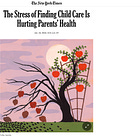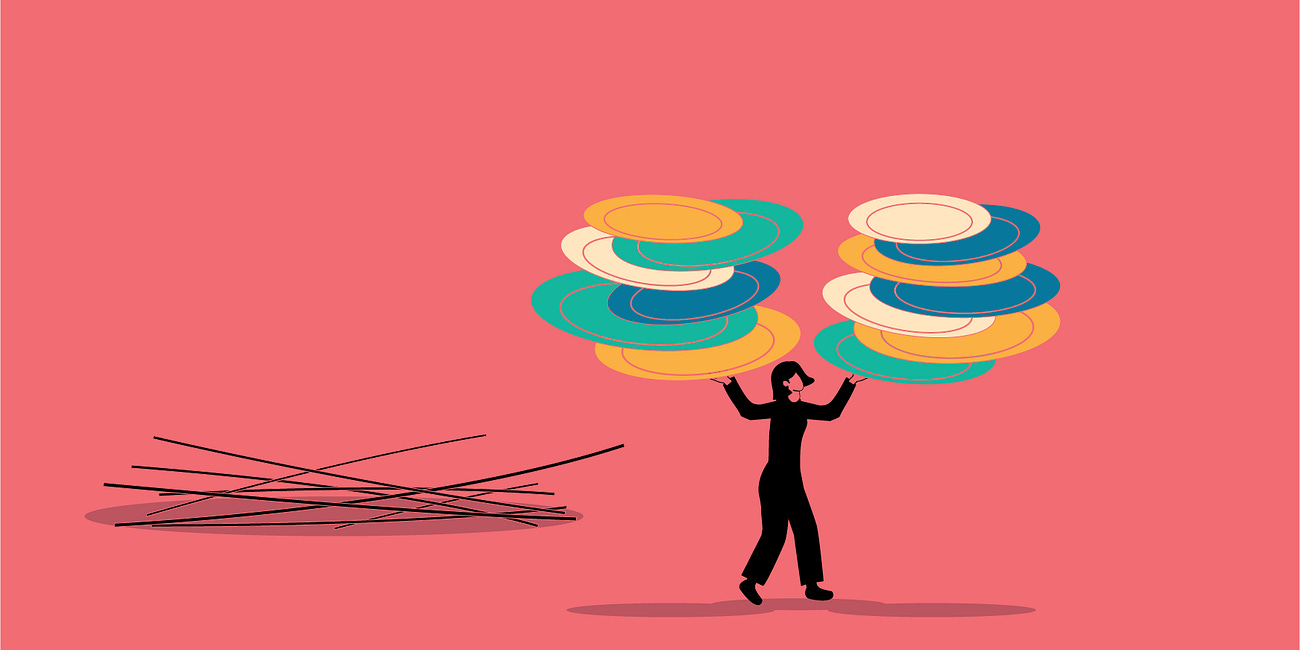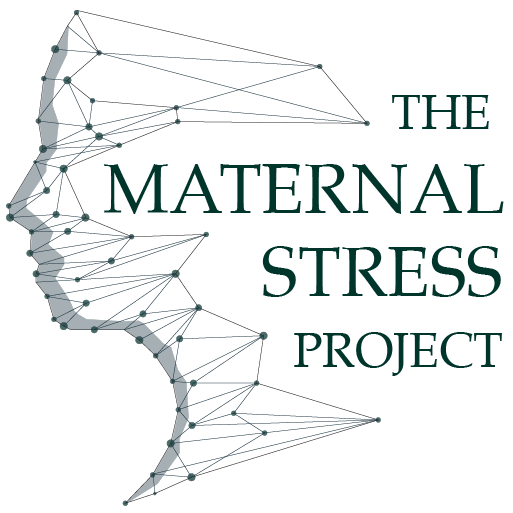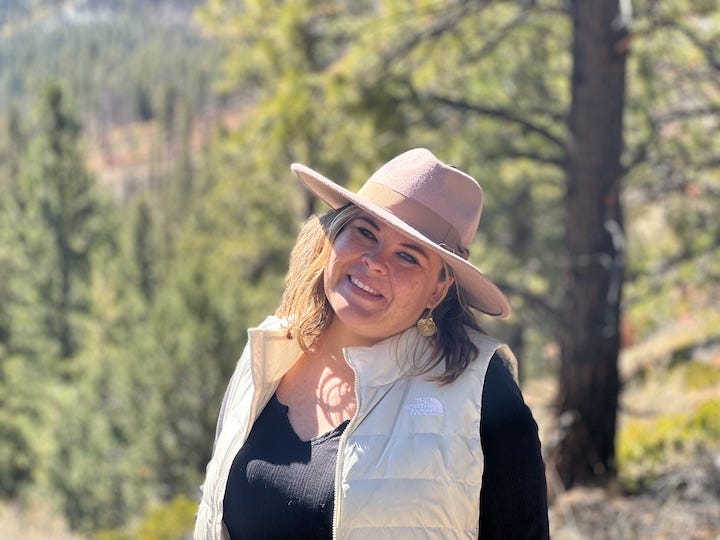The case of modern American parenthood
Part two in our three part discussion about mental load and motherhood
Is modern parenting really that much harder (and more stressful) now than for generations past?
The Surgeon General seems to think so:
“Many parents also struggle with a modern practice of time-intensive parenting and contemporary expectations around childhood achievement that tells them if they are not doing more and more for their children in the escalating race for success, they will fail as parents.” – from the The U.S. Surgeon General's Advisory on the Mental Health & Well-Being of Parents
In our last post on the mental load, we talked about the importance of a definition that captures both the cognitive and the emotional weight of the problems on our minds.
Even though the Surgeon General Advisory on parenting stress and parental mental health did not ever mention the phrase emotional labor and somehow skipped over naming mental load, that paragraph about “modern practice of time-intensive parenting and contemporary expectations” smacks of the emotional component weighing down the cognitive labor of parenting in America today.
This point was further explored by NYT reporter, Claire Cain Miller this week. With a special call out to the even more recent pressure parents are feeling:
“Parents feel they need to make up for what their children lost during the pandemic. Social media has made comparisons with other parents inescapable. Technological change has made it harder to prepare children for future work. Americans have less faith that the political system can address families’ problems.” — Claire Cain Miller
Let’s peel this mental load onion a wee bit more.
Where we left off – Haley had walked through her experience finding child care for her toddler and all the cognitive and emotional aerobatics that went into the process. We noted that it is often the emotional component of the mental load that makes it feel the heaviest and most stressful.
We start back on this point…
Molly:
Back to your perspective on emotional labor and your experience with child care…
I'm thinking about American parenting, child care, and the current state of how we focus on safety while bringing in so many more elements to that consideration. We may ask: “and are they safe?” while also including “is my kid happy?”; “are they loved?”; “are they engaged?”; “are they…?”
Beyond the basic fears about safety in child care1 and schools2, we're in this society where we (mothers/parents) feel more responsible for the future wellbeing of our children. Are they doing enough in school? Are they doing enough activities to get into a good college? Are they getting into that good college? Are they happy in that “good” college? Are they getting a job that will allow them to be financially stable AND fulfilled?
“This intense parenting moment and the cultural pressure to not fuck up our kids seems representative of the disproportionate emotional labor piling onto mothers.” — Molly
Modern parents are over-invested in our children’s futures in all these ways. Tack on the obvious inequity issues given that there are parents who can afford the advantageous extras – private schools and tutoring and extracurriculars – and parents who cannot. Even the relatively recent boom in the privatization of youth sports adds an element of privilege to athletics3.
Regardless of what you can afford and what you cannot, this intense parenting moment and the cultural pressure to not fuck up our kids seems representative of the disproportionate emotional labor piling onto mothers4.
Back to Dr.
(mentioned in the first part of the discussion), she uses this great term, opportunity hoarding, which is defined as individual advantages translating into group-level advantages when it comes to raising children with and without privilege. There are deep inequity issues with opportunity hoarding5 at a broad scale that I won’t get into, but on the individual level, I wonder if the concept of opportunity hoarding can also apply to the emotional labor of the mental load. Specifically, how does opportunity hoarding reflect and also divide the emotional labor we carry on both sides of the equation.For the more advantaged, those actively seeking the opportunities for their kids, is this behavior a self-preservation tool that brings a sense of control to the anticipatory fear around future outcomes? For the less advantaged, who recognize that opportunities exist but cannot afford them in time or money, does having a sight line to “what other people do for their kids’ futures” create a more intense emotional response and, therefore, additional stress?
Again, it’s usually the mothers carrying most of the load on both sides – worrying about all the potential outcomes of not doing the extras, and also going through all the steps and signing up for all the extras, recognizing their kids’ feelings about each extra, re-budgeting to accommodate each extra, etc.
Haley:
As a parent, you’re in charge of preparing your kids to go into the exact world we’re struggling through every day, a world where there’s no social safety net.
So you're saying – “Okay, how can I prepare these kids for this world that has been so brutal to me? Well, I have to compete. I have to do all these things. I have to take all of this and put it on my plate. Because otherwise, XY and Z could happen to my kid and it will be my fault.””
In my dissertation research about the Great Recession, I was talking to a mom who had been laid off and she was telling me that one of the things she liked about her unemployment was the chance to have more conversations with her daughter. Her daughter was like 12 or 13 at the time. I'd asked ”Well, what were those conversations like?” And she said, “Well, we talked about her potential career, and how she needs to be professional, and prepare herself.” It was this moment of wow, you are taking on career coaching for your child.
“We are all trapped in a sense that we're all on our own, and we need to carry everything with us.” — Haley
What a heavy burden parents carry now that parents in the past did not have to carry! And the sad part is, no matter how prepared that kid is, she can still get laid off. Just like her mom. We are all trapped in the sense that we're all on our own, and we're carrying everything with us, and anything that happens to us is our fault.
This is one of the things I want to think more about with the mental load – and this idea that came up in the comments to your story on child care – this idea that if you’re overwhelmed with child care and parenting, you should really cut back your spending so one of the parents can stay at home.
That choice does not make the mental load go away! My sister-in-law quit her paid work after she had her first baby. Her mental load is enormous and, in some ways, it is worse because there's this cultural assumption that she should carry the whole mental load because she's not bringing in income like my brother is. And that’s not reasonable.
As a couple, they do work a lot on sharing the load, but, more broadly, this issue is still just invisible to society. We still hear: “Just stay home. That's the answer”
But parenting is still too hard. And those big worries about safety and well being and preparedness don’t get easier.
Molly:
The interesting thing about that comment on the NYT piece was that I actually fought for language to avoid representing the issues around child care as a working mom problem. Nowhere in that op-ed does it say anything about this relating to working moms only.
The story at the top of the article focuses on the experience of one woman, Julia. The behind the scenes gist of it is that Julia wasn't working at the time that her child care center closed and the fact that she wasn’t working actually added to her emotional labor and related directly to how she wrestled with the idea of her child care falling through. She had that moment of “well, I could be home with my kids”. And that thought alone spun up her anxiety and guilt because she had to wrestle the idea of “how much do I actually need this?” alongside the scrambled panic of the life shift that is a loving child care set up being ripped out from underneath you.
“We all need child care. We all need access to early education centers. We all need this support to some degree. And the answer is not ‘one parent stays home’. That's not the answer. Stop presenting that scenario as a solution!” — Molly
There is so much more to her story, of course but having people respond with a comment or expectation that the solution is moms not working and taking care of their kids is funny to me because that oppositional view is one of the reasons why we wanted to neutralize working/not-working and craft the argument that child care is health care FOR EVERYONE in the first place!
We all need child care. We all need access to early education centers. We all need this support to some degree. And the answer is not one parent stays home. That's not the answer. Stop presenting that scenario as a solution6!
Haley:
I believe there's research about depressive symptoms and stress among mothers who don't engage in paid work and it's not great.
It's not like they’re just living it up in their home, stress-free. It's real work, and the pressure to do it all well may be even higher for stay-at-home parents!
Molly:
That was one big learning from COVID. Obviously, it's not a clean research study, because we were all in the middle of a global pandemic and it was a stressful time, in and of itself. But one of the things that we learned from it was, when you take away child care from everybody – equal opportunity child care removal – you see significant effects pop out.
“Women disproportionately stepped into a heavier caregiver role during this already stressful time because the (already flimsy) structural support vanished overnight. And there were real health repercussions of that.” — Molly
It's one of those things where these effects have probably always been there; they've just been simmering in communities and populations that researchers don't tend to study or it's been simmering in a way that hasn't allowed for statistical significance. Whatever you want to say for why we haven't seen this before, with COVID, there was a curtain that lifted and the sample size was the entire world.
When you universally took away child care, you had a clear economic impact – women left the workforce – and you had clear negative health effects – mental health issues increase, especially postpartum depression.
Women disproportionately stepped into a heavier caregiver role during this already stressful time because the (already flimsy) structural support vanished overnight. And there were real health repercussions of that.
Haley
That’s exactly it.
I think when we use a mental load lens to look at these problems, we can see them differently.
“That’s a structural and cultural problem, not an individual one.” — Haley
It gets us out of our never-ending “mommy wars” framing. You could be a “trad wife” or you could be a full-time working, single mother, and your problem – a heavy, stressful mental load – is still basically the same.
Now we’ve reframed the solution from individual advice—quit your job, or get a job, or ask for a raise, or get your husband involved, or whatever—and moved to thinking about solutions that actually consider the many decisions moms make in our society and all the pressure we put on them to make the “right” ones.
That’s a structural and cultural problem, not an individual one.
Next up!
Is mental load stressful?
Maybe you think that is a silly question with a simple answer: “Yes, yes it is,” you might say (we would respond similarly!)
And if that is indeed the answer, does that mean we can reduce parental stress by decreasing the mental load of parenting?
No simple answer to that one.
In the last part of our conversation, we start tackling how stress shows up and mental load and try to answer the question — what do we do about it?
Subscribe subscribe subscribe! Share share share! Thank you!
On the side purely related to safety, there are things that are missing in the U.S. that make this a very legitimate part of the mental load for parents. In one of the child care focused pieces Molly wrote for the Maternal Stress Project, there is a section focused on safety, specifically, reporting from The 19th News about how transparency around safety when it comes to childcare providers is just not there yet. There weren't even laws around transparency until about 10 years ago.
gun control. gun control. gun control.
Take the emotional labor of not being able to have your excellent soccer playing kid play on a private club team because it's $1,500++ a year and an insane parental time commitment and so you enter this spiral: “they're not going to play in high school” and that means… “they're not going to play in college” and then “they're not going to get that scholarship that's going to allow them to even go to college” which spirals into “they're not they're not going to be have the future that I want for them” and on and on.
That’s a lot to hold. And… it is just youth freaking soccer!
Again -- disproportionately affecting mothers as it relates to gendering of parenting expectations. Add in the guilt and shame that hits mothers more than fathers.
But, yes, a lot of dads also feel the pressure to not fuck up their kids.
See Dr. Calarco's most recent book or her 2018 book on how this shows up in the classroom.
You know what else is NOT a solution to the lack of accessible and affordable child care in this country?
Grandparents.
Looking at you, J.D. 😡😤🤬












